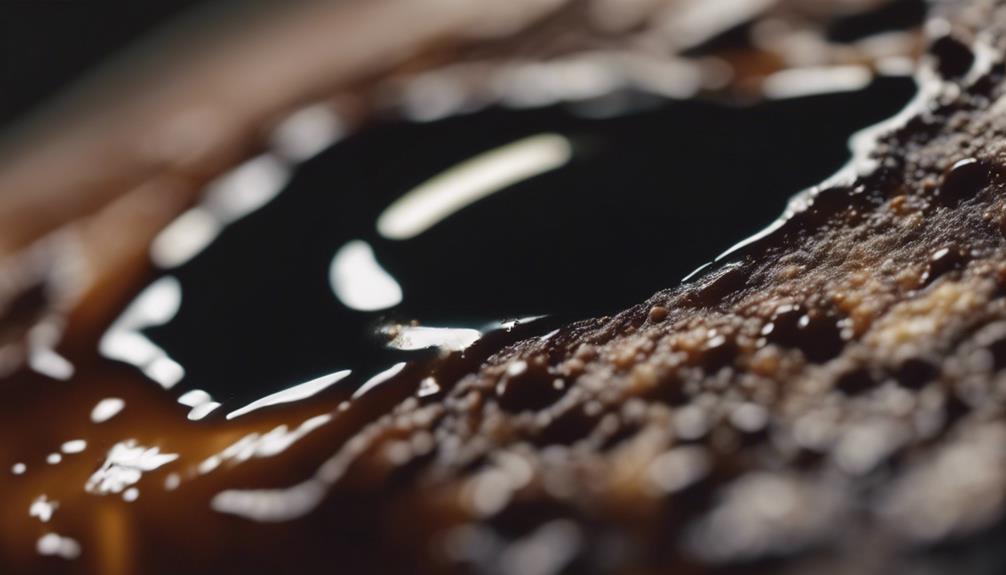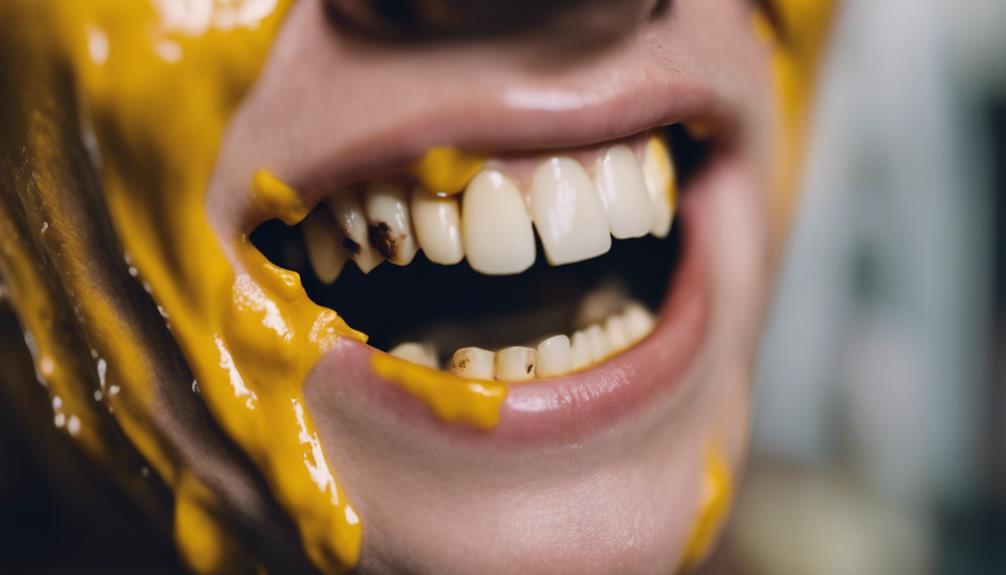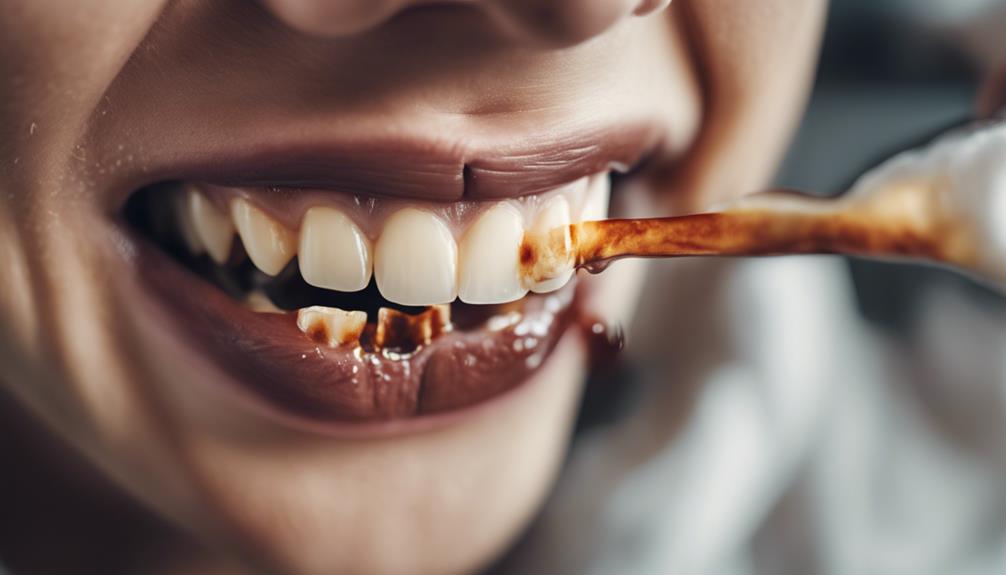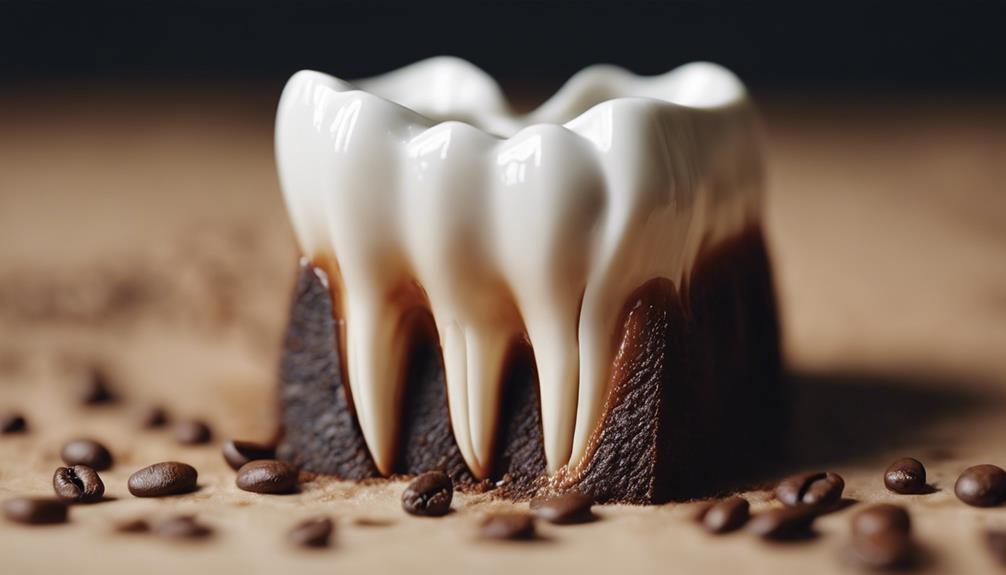Coffee’s impact on your teeth goes beyond just staining. The acidic nature of coffee can wear away enamel, leading to sensitivity and a higher risk of cavities. Tannins and pigments in coffee can cause noticeable yellow stains, while the acidity can weaken enamel protection. Gum health may also be affected by the acidity of coffee, potentially increasing the chances of gum disease and sensitivity. To minimize damage, it is recommended to rinse with water after drinking coffee, use a straw, add milk, and maintain good oral hygiene. Being aware of these effects can help you safeguard your teeth from potential long-term damage. More information on this subject is available for further insights.
Key Takeaways
- Coffee can stain teeth due to tannins and pigments.
- Acidic nature of coffee can erode tooth enamel.
- Yellow stains and enamel weakening are common effects.
- Coffee consumption may impact gum health negatively.
- Preventative measures like rinsing and dental check-ups are crucial.
Staining Effects of Coffee
Over time, coffee stains your teeth due to the tannins and dark pigments in the beverage. These compounds have a knack for adhering to your enamel, leading to visible yellow discoloration on your teeth.
Regular consumption of coffee can exacerbate this staining effect, especially when additives like sugar and cream are involved. The more intense the color of your coffee, the more likely it's to leave noticeable stains on your teeth.
This dental staining isn't just a superficial issue; it can impact your overall oral health and hygiene. The dark pigments in coffee can cause surface discoloration of your teeth, affecting your smile and confidence.
To combat the staining effects of coffee, it's essential to practice good dental hygiene, including regular brushing, flossing, and dental check-ups. Being mindful of your coffee consumption and its potential impact on your teeth can help you maintain a bright and healthy smile.
Acidic Nature of Coffee

Coffee's acidic nature is a major concern for your oral health. The pH level of coffee, around 5, poses a risk of enamel erosion.
This acidity can lead to tooth sensitivity issues and increase the likelihood of enamel wear, potentially causing long-term damage if not addressed.
Acid Erosion Concerns
The acidic nature of coffee poses a significant risk to your teeth by weakening tooth enamel, making them more vulnerable to decay and sensitivity. Coffee, with a pH level around 5, is considered acidic and can lead to acid erosion, gradually eroding the enamel over time.
This erosion can result in enamel loss, which in turn increases the likelihood of developing cavities and other dental issues. Additionally, enamel erosion caused by acidic coffee can make your teeth more prone to discoloration and staining.
Regular exposure to coffee's acidity can wear down the protective layer of enamel on your teeth, further compromising their health. It's essential to be mindful of the impact of coffee's acidity on your oral health and consider ways to mitigate these effects, such as drinking water alongside coffee, using a straw to reduce direct contact with teeth, and maintaining a good oral hygiene routine.
Enamel Wear Risk
The acidic nature of coffee poses a significant risk to your teeth by accelerating enamel wear, leaving them vulnerable to damage and sensitivity over time. Enamel erosion, caused by the acidity in coffee, softens the protective layer of enamel on your teeth, making them more prone to issues like discoloration and decay.
Frequent consumption of coffee throughout the day can exacerbate this enamel wear risk, increasing the likelihood of experiencing tooth sensitivity. To mitigate the effects of coffee on your teeth, it's advisable to limit your intake of coffee and maintain good oral hygiene practices.
Tooth Sensitivity Issues
Tooth sensitivity can be exacerbated by the acidic nature of coffee, leading to discomfort when consuming hot or cold foods and beverages. The enamel erosion caused by the acidity in coffee can result in increased sensitivity to temperature extremes.
Regular consumption of acidic beverages like coffee can contribute to enamel wear, potentially exposing the underlying dentin and further heightening tooth sensitivity. The pH level of coffee plays a significant role in weakening the enamel, making teeth more prone to hot and cold sensitivity.
Over time, the enamel erosion from drinking acidic coffee can worsen tooth sensitivity, impacting your overall oral health. It's crucial to be mindful of the potential damage that acidic beverages, such as coffee, can have on your teeth, and to contemplate moderating consumption or taking steps to mitigate the effects, like using a straw to minimize contact with teeth.
Yellow Stains on Teeth

Coffee contains tannins that can lead to yellow stains on your teeth by binding to the enamel. Despite regular brushing, these stains may persist, necessitating professional teeth whitening for effective removal.
To prevent further staining, consider limiting your intake of coffee and practicing good oral hygiene.
Staining From Coffee
Coffee's tannins and dark pigments can cause noticeable yellow stains on your teeth.
The tannins present in coffee adhere to the enamel, leading to the development of yellow stains over time. These dark pigments can also contribute to visible discoloration, affecting the aesthetics of your smile.
Regular consumption of coffee can result in stubborn yellow stains that may not be easily removed with regular brushing alone. However, it's important to note that coffee staining primarily affects the external surface of the teeth and can often be addressed during dental cleanings.
By maintaining proper oral hygiene practices and considering professional whitening treatments, you can combat the yellow stains induced by coffee consumption. These treatments can help to restore the natural whiteness of your teeth and enhance your overall oral appearance.
Prevention and Treatment
To prevent and treat yellow stains on your teeth caused by coffee, incorporating regular brushing and professional cleanings into your oral care routine is vital. Coffee's tannins can lead to these stains, but taking proactive steps can help minimize their impact.
Brushing your teeth at least twice a day with whitening toothpaste can reduce the appearance of yellow stains. Additionally, scheduling professional cleanings with your dentist can help remove stubborn stains and prevent them from worsening. Drinking water after consuming coffee can also help wash away staining compounds, reducing their effects on your teeth.
Maintaining good oral hygiene practices is essential in preventing and treating yellow stains. Limiting your coffee intake and being consistent with your oral care routine can go a long way in keeping your teeth looking healthy and bright.
Enamel Weakening

The acidity in coffee can weaken your tooth enamel, making it more vulnerable to decay and sensitivity. Enamel erosion caused by the acid in coffee can lead to staining, yellowing of teeth, and create an entry point for decay-causing bacteria.
This weakening of enamel is concerning as it reduces the protective layer of your teeth, leaving them more exposed to potential harm. Regular exposure to acidic coffee can gradually wear down the enamel, increasing the risk of dental issues.
To combat the effects of coffee on enamel, consider using enamel-strengthening toothpaste and make sure to schedule regular dental check-ups. These steps can help maintain the health of your enamel and reduce the negative impact of coffee consumption on your teeth.
Impact on Gum Health

Weakening your enamel is just one way that coffee can impact your oral health; now, let's explore its effects on your gum health.
When it comes to your gums, coffee consumption can have detrimental effects that shouldn't be overlooked. Here's how coffee can impact your gum health:
- Gum Disease: The acidity in coffee and the potential for bacterial growth can increase the risk of developing gum disease.
- Gum Sensitivity: Regularly drinking coffee without proper oral hygiene can contribute to gum sensitivity, making your gums more prone to discomfort.
- Gum Recession: The acids in coffee can irritate gum tissue, leading to inflammation and potential gum recession over time.
- Bleeding: Improper care after consuming coffee can lead to gum bleeding, indicating potential issues with gum health.
To prevent these problems, it's essential to maintain good oral hygiene habits when consuming coffee. Proper care can help mitigate the negative impact coffee can have on your gums and overall oral health.
Preventative Measures for Coffee Drinkers

How can you protect your teeth from the negative effects of coffee consumption?
To minimize the impact of coffee on your teeth, consider some preventative measures.
To begin with, after drinking coffee, rinse your mouth with water to help neutralize acidity and reduce staining.
Using a straw when consuming coffee can also help minimize direct contact with your teeth, reducing the risk of enamel erosion.
Adding milk to your coffee can decrease its staining potential on your teeth.
Additionally, regular dental cleanings and check-ups are essential for coffee drinkers to prevent long-term damage.
By maintaining good oral hygiene practices, such as brushing and flossing regularly, you can further minimize the impact of coffee on your teeth.
These simple yet effective steps can go a long way in protecting your teeth from the potential harm caused by frequent coffee consumption.
Frequently Asked Questions
How Damaging Is Coffee to Teeth?
Coffee can be damaging to your teeth due to its acidity, which can wear down enamel and increase sensitivity. The tannins in coffee may lead to yellow staining, affecting your smile's appearance.
Regular coffee consumption, combined with poor oral hygiene, can raise the risk of gum disease. Dark pigments in coffee can visibly stain teeth, especially with frequent intake. Adding sugar or cream can worsen dental issues by accelerating staining and decay.
How Much Does Coffee Damage Teeth?
Coffee can greatly harm your teeth, as its acidity weakens enamel, leading to decay.
Additionally, tannins in coffee can cause unsightly stains on your teeth.
Excessive consumption raises the risk of gum disease.
To mitigate these effects, prioritize regular dental check-ups and maintain proper oral hygiene practices.
Stay informed about the potential harm coffee can pose to your oral health and take necessary precautions to protect your teeth.
What Do Dentists Say About Coffee?
Dentists caution that coffee's acidity can weaken enamel, leading to tooth decay.
The tannins in coffee can cause yellow staining on your teeth, affecting your appearance.
Regularly consuming coffee without proper oral hygiene can heighten the risk of gum disease.
To prevent dental issues, it's advisable to minimize sugar and cream in your coffee.
Maintaining good oral hygiene practices is essential for coffee drinkers to safeguard their teeth from potential damage.
What Happens to Your Teeth When You Stop Drinking Coffee?
When you quit drinking coffee, your teeth can experience positive changes. Staining may diminish, enamel erosion could begin to repair, gum health may improve, saliva production may normalize, and teeth sensitivity might decrease.
Your oral health can benefit from giving up coffee, allowing your teeth and gums to recover and strengthen. So, quitting coffee could lead to a healthier smile and overall oral well-being.
Conclusion
To sum up, it's crucial to be mindful of the potential damage that coffee can have on your teeth.
Did you know that 64% of coffee drinkers experience yellowing of their teeth due to the staining effects of coffee?
By implementing preventative measures such as regular dental cleanings, using whitening toothpaste, and moderating your coffee intake, you can help protect your teeth and maintain a healthy smile.









